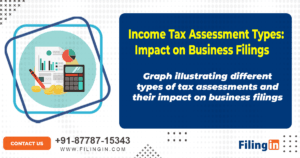How the Different Types of Assessment in Income Tax Affect Your Business Filing
For businesses, income tax filing isn’t just a legal obligation—it’s also essential for financial health and compliance. Understanding the different types of assessments in income tax is key to ensuring that your filings are accurate, compliant, and legally sound. The Income Tax Act, 1961, offers various methods of assessment, each with its implications on tax filings. This article explores how these assessments affect business filings and the best practices companies should follow.

Understanding the Types of Assessment in Income Tax
The Income Tax Act has laid out several types of assessments to ensure that businesses report their income accurately and pay the right amount of tax. These assessments range from basic self-evaluation to more rigorous scrutiny and re-evaluation procedures. Here are the key types of assessment:
1. Self-Assessment (Section 140A)
Self-assessment is the most fundamental form of income tax evaluation. In this, businesses calculate their own taxable income based on their financial records and submit their returns.
Impact on Business Filing
Businesses must maintain accurate records to avoid errors. Missteps in self-assessment can lead to penalties, interest, or further scrutiny from tax authorities.
2. Summary Assessment (Section 143(1))
Summary assessment is an automated process in which the tax department checks the mathematical accuracy of the return filed. It matches the data with tax payments and TDS certificates already available to the department.
Impact on Business Filing
Errors in the return or discrepancies in TDS claims may trigger rectifications. Ensuring accurate data from the start helps avoid delays in refunds or correction notices.
3. Scrutiny Assessment (Section 143(3))
This assessment involves a detailed examination of your return. Tax authorities scrutinize your claims, deductions, and income to ensure accuracy.
Impact on Business Filing
Businesses must be prepared with comprehensive financial records like invoices and contracts. Any discrepancies found during scrutiny could lead to additional tax liabilities.
4. Best Judgment Assessment (Section 144)
In cases where businesses fail to file returns or if the tax authorities find the submitted information unsatisfactory, they proceed with a “best judgment” assessment. The Assessing Officer estimates the company’s income and tax liability based on available data.
Impact on Business Filing
Non-compliance with tax filings or incorrect information can lead to higher tax liabilities and even disputes. Timely and accurate filing is crucial to avoid such situations.
5. Re-evaluation or Income Escaping Assessment (Section 147)
This assessment is triggered when tax authorities believe some income has escaped assessment due to under-reporting or concealment. The authorities re-evaluate the business’s income from previous years.
Impact on Business Filing
Incorrect or incomplete filings can lead to reassessment, requiring the business to pay additional taxes, penalties, and interest. Transparency in reporting income is essential to avoid such a scenario.
6. Faceless Assessment (Introduced in 2020)
Faceless assessments are part of a government initiative to reduce corruption and streamline the process. Under this system, assessments are done online, and the officers handling the case remain anonymous.
Impact on Business Filing
Businesses must ensure that their financial records are digitized and accessible online. Faceless assessments provide a more transparent and efficient process, but they require businesses to be tech-savvy and organized.
How the Types of Assessment Affect Business Filings
1. Accuracy in Reporting
Every type of assessment underscores the importance of accurate reporting. Self-assessment relies on precise calculations, while scrutiny assessments demand thorough documentation for each claim. Businesses must adopt sound accounting practices and stay updated with tax laws.
2. Financial Record Maintenance
The types of assessment require businesses to maintain detailed financial records, such as invoices, receipts, and bank statements. Without proper records, businesses may face increased liabilities during scrutiny or reassessment.
3. Risk of Penalties
Different assessments bring various risks. For instance, in best judgment or income escaping assessments, tax authorities may estimate higher income, resulting in elevated tax liabilities. Non-compliance or failure to respond to tax notices can lead to penalties.
4. Timely Filing and Response
Faceless and summary assessments streamline the filing process, but timely filing is critical. Summary assessments allow for faster refund processing, while faceless assessments reduce the need for direct interaction, but both require efficient digital record-keeping.
5. Business Reputation
Inaccurate or non-compliant filings can damage a company’s reputation. Tax disputes or discrepancies revealed during assessments can lead to public scrutiny. Maintaining accurate filings and timely responses ensures a business’s reputation remains intact.
Best Practices for Businesses in Managing Assessments
1. Invest in Professional Accounting
A skilled accounting team can help businesses maintain accurate records and ensure compliance, thereby minimizing errors that could trigger an assessment.
2. Regularly Audit Your Filings
Self-audits help businesses identify discrepancies or errors before they are flagged by tax authorities.
3. Respond to Notices Promptly
Failure to respond to tax notices can escalate assessments and lead to penalties. Timely responses ensure that assessments remain manageable.
4. Adopt Digital Compliance
With the rise of faceless assessments, businesses must move toward digital tax filing and record-keeping to ensure seamless compliance with modern tax practices.
Conclusion
The types of assessment in income tax significantly influence how businesses approach their tax filings. By understanding the implications of each assessment type, businesses can better prepare for tax compliance, avoid penalties, and maintain financial transparency. Investing in proper accounting and digital compliance measures will ensure a smoother tax filing experience.